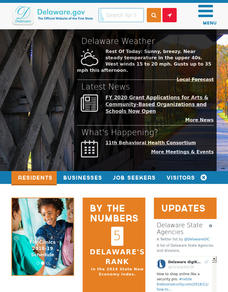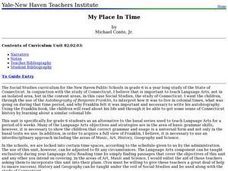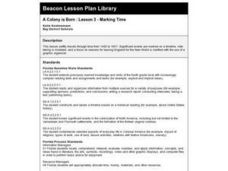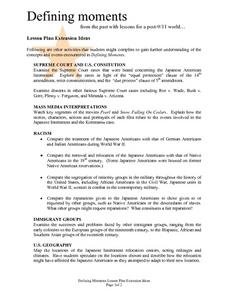Curated OER
Imperialism in Africa
Students study imperialism in Africa. For this Imperialism lesson, students consider how democratic revolutions around the world led to imperialism in Africa.
Curated OER
Why Did Delawareans Use Slaves?
Learners read about an indentured servant, and complete a chart comparing slaves and indentured servants.
Curated OER
Birth of a Nation
Fifth graders portray one of the actual framers of the Constitution. They summarize each class period with a journal entry and culminate the experience with the actual framing and signing (or not signing) of the Constitution.
Curated OER
Dos mapas de Florida, el Caribe y parte de Sur America
What can maps tell us about the past? Find out with a Spanish lesson that incorporates geography. After examining maps individually, comparing two old maps of Spanish Florida and writing notes in the provided Venn diagram, pupils pair up...
Curated OER
My Place In Time
Sixth graders interpret Franklin's style, his ease of writing and content, using this to inspire, motivate and guide them to do more writing. They list Franklin's civic accomplishments and political accomplishments. They name 4...
Curated OER
America Established Because of Protest
Students explore events and causes that led to American Revolution and examine popular pro-Patriot renderings and texts of these issues created both at that time and in later years. Students then prepare and deliver oral presentations...
Curated OER
A Colony is Born : Lesson 3 - Marking Time
Fifth graders refer to text and timeline to fill in a graphic organizer and timeline from 1492-1607. They participate in a class discussion that allows for speedy accumulation of events and fill in their own timelines. They work in small...
Curated OER
Four Enlightenment Thinkers
Students examine lives, philosophies, and political beliefs of four Enlightenment Thinkers: Baron de Montesquieu, Jean-Jacques Rousseau, Thomas Hobbes, and John Locke. Students then work with partner to write short speech from...
John F. Kennedy Presidential Library & Museum
Military Advisers in Vietnam: 1963
How did the beginning of the Vietnam War factor into the Cold War with the Soviet Union? As part of a study of American involvement in Vietnam, class members read a letter address to President Kennedy and his response in which...
Curated OER
How did Geography Affect the Economy of the Colonies
Eighth graders examine the impact of geography on a region. In this geography lesson, 8th graders study the themes of geography. Students write an open response to a question.
Curated OER
Community & Architecture
Students investigate the Bamum people of Cameroon and the use of symbols in African societies. They read a handout, and design a palace using African symbols, presenting and describing their design to the class.
Curated OER
A Full Military Experience
Eighth graders watch electronic field trip entitled Call to Arms, and simulate daily life of eighteenth-century soldier, including marching, camp building, cannon firing, and sharing common meal. Student groups form regiments by signing...
Curated OER
1986 Capsule: Hispanic Influence in the New World
Students research the conditions in Spain during the 15th and 16th centuries. In groups, they write a paper on the information they gathered during their research and why the situation is unique to Spain. As a class, they discuss the...
Curated OER
Exploring Pioneer America
Fourth graders research pioneers who had a strong influence on westward expansion. In this westward expansion lesson, 4th graders write an essay about four pioneers and an interview script about one. Students work in pairs to present...
Curated OER
Reconstruction of Iraq: A Lesson of Historical Precedents
Students view a video clip about the reconstruction efforts in Iraq. They work together to compare and contrast the reconstruction plans after the Spanish-American War and World War II. They compare those results to the situation in Iraq.
Curated OER
Mass Production Using an Assembly Line
Fifth graders examine the industrial revolution. In this industrialization lesson, 5th graders explore the concept of mass production via the assembly line. They then create an assembly line which demonstrates its costs and benefits...
Curated OER
The Crucible
Students explore the historical drama, "The Crucible" by Arthur Miller looking for examples of society's mistrust of nonconformity and the injustice that can as a result of fear.
Curated OER
The U.S. Trade Embargo on Cuba
Students examine perspectives for and against the U.S. trade embargo on Cuba, develop a position on the embargo and articulate viewpoints in a public forum.
Curated OER
Defining moments from the past with lessons for a post-9/11 world...
Learners examine extension ideas concerning 9/11, Defining Moments. They analyze a variety of Supreme Court cases, the U.S. Constitution, Mass Media Interpretations, Racism, Immigrant groups and U.S. geography. Many questions are asked...
Curated OER
Bison on the Plains
Fifth graders explore U.S. geography by reading assigned text about American Indians. In this migration lesson, 5th graders identify the differences between Native Americans and European settlers who traveled through middle America in...
Curated OER
Joseph Bellamy House
Students use maps, readings, drawings and photos to research the career and importance of Reverend Joseph Bellamy as a religious leader in New England during the Great Awakening. They also identify the basic principles of Puritanism.
Curated OER
Settling the Plymouth Colony
Students label blank maps with the names of the New England Colonies. They explain the difficulties that the Pilgrims had and how hard they worked to survive in Plymouth.
Curated OER
The Information Revolution: A Hypothetical Case
Learners consider the implications of the information revolution. In this information age lesson, students discuss informatics and the misuse of information. Learners form a fictional bureau of information control and hold a simulated...
Curated OER
Working Watermelon
You're going to wish you had a watermelon for this lesson! Class members read about watermelons and make a salad in class to sample. They also perform estimates, measurements and calculations on a watermelon. They predict what percentage...

























